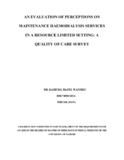| dc.description.abstract | Background
The provision of maintenance dialysis is challenging the world over, but more so in the developing world. The main contributor to this situation is the lack of standardization of practices and inequitable resource allocation, which affect quality of service provision in resource limited settings. There are several challenging aspects in the management of end stage renal disease patients on chronic dialysis that impact on individual patient outcomes. This study evaluates the perception of end stage renal disease patients and providers on the quality of maintenance hemodialysis services.
Objective of the study
This study aimed to evaluate the perceptions on the quality of haemodialysis service provision among end-stage renal disease patients and providers at the Kenyatta National Hospital, Nakuru General ospital and Machakos Level 5 Hospital.
Study design & Methodology
A descriptive cross-sectional hospital based study. The study employs a mixed method approach, incorporating both quantitative and qualitative methods. The tools for the study comprise a semi-structured questionnaire administered to ESRD patients, a guide for key informant interviews administered to providers, a simple checklist for resource
availability and participatory observation. A triangulated approach for analysis will be achieved by including the perspectives of ESRD patients and health care providers at three different study sites.
Results
144 patients with end-stage renal disease receiving regular maintenance hemodialysis, aged between 18 and 95 years, participated in the study. There were eighty nine males (61.8%) and fifty five females (38.2%), with a female-to-male ratio of 1:1.62. The mean age of the participants was 48.3 ± 16.5 years. The mean duration of hemodialysis was 20.8 ± 25.9 months. Approximately three quarters (76.6%) of the study participants had medical cover provided by the National Health Insurance Fund.
In the 5-item Doctors’ Communication and Caring Domain (DCC), the positive response, i.e. always & usually, was selected most frequently to each question in the domain, ranging from 77.2 to 86.9%. In the 12-item Quality of Dialysis Center Care and Operations (QDC), the highest proportion of negative responses were to delays in being connected to machine, explanation of blood test results and handling problems that arose during dialysis. The top 3 recommendations given by patients were: Increase in dialysis machines, comprehensive NHIF funding and improvement in service delivery. Financial constraints, high patient burden and shortage of staff and machines were the main challenges to the provision of hemodialysis services according to the health service providers. The main interventions recommended were financial interventions, capacity building, on job training of nurses, referral and transplantation services.
Conclusion
In this study patient and provider perceptions, as well as an assessment of resource availability were focal to the evaluation of the quality of maintenance haemodialysis services. Patient perception to the provision of services was positive overall. The aspects of care perceived negatively include: waiting time, explaining aspects of care and blood results in a way that is easy to comprehend and concerning doctors the amount of time spent with the patient. The recommendations proposed by patients and providers are all currently being implemented through the intervention of relevant stakeholders. | en_US |
| dc.description.department | a
Department of Psychiatry, University of Nairobi, ; bDepartment of Mental Health, School of Medicine,
Moi University, Eldoret, Kenya | |



